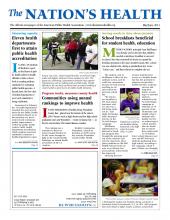A regular smoker with a broken leg bone should not be surprised to be on crutches a month longer than a nonsmoker with the same injury, according to a recent study.
It takes 30 weeks for a regular smoker to heal a fracture, six weeks longer than a nonsmoker, said Samir Mehta, MD, a study author and chief of the University of Pennsylvania Perelman School of Medicine’s Orthopaedic Trauma and Fracture Service.
The study, presented in March at the American Academy of Orthopaedic Surgeons annual meeting, examined more than 6,400 people across three medical study databases of smokers who suffered injuries treated with and without surgery.
Research published as early as two decades ago shows the link between cigarette use, slow healing and infections post-surgery. But Mehta said his study’s focus on bone fractures is important because they can be a huge burden on smokers, their families, and society.
“The amount of time and cost associated with managing fractures that don’t heal, (the) time off work, the resources required to have it heal the first time on their own is tremendous,” Mehta told The Nation’s Health. “The only thing worse than a bone that hasn’t healed is a bone that’s infected and hasn’t healed.”
Mehta said nicotine in cigarettes collapses the body’s small blood vessels, which affect the body’s circulation. Smoking may also have an impact on bone-making cells, called osteoblasts, and bone-removal cells, called osteoclasts, Mehta said.
“You can have the fanciest four tires on your car, but if you don’t have any gas you’re not going to go anywhere,” Mehta said. “Smoking is like siphoning off the gas tank.”
There is a 12 percent higher chance of an open fracture — where bone sticks out of the skin — improperly healing in a smoker compared to a nonsmoker, Mehta said. There is a 15 percent higher chance a smoker who fractures her or his tibia — or shinbone — will not heal properly, Mehta said.
A shinbone fracture for a smoker is major because that bone is a more difficult one to heal than the femur — the largest bone in the leg inside the thigh, Mehta said. It can take 32 weeks for a smoker’s shinbone fracture to heal, compared to 25 weeks in a nonsmoker, he said.
“The tibia has a poor blood supply to begin with,” Mehta said. “Your thigh has muscle. You can feel your tibial shaft. It’s got less of a blood supply. It’s a higher chance for it to be open. There’s really nothing between the skin and the bone.”
Mehta said he does not know yet what effect quitting smoking after an injury would have on the healing process in someone who has smoked regularly.
“By not putting the toxins in your body repeatedly, the constriction might not happen like if you smoked,” Mehta said. “But it would take time for nicotine and metabolites to get out of your body.”
While Mehta said he and his fellow physicians do everything stop an infection, patients have to participate, too. Mehta strongly encourages patients to quit smoking and warns them that continuing to smoke after a fracture could lead to bone infections. Repeated infections that require multiple surgeries, in a worst-case scenario, could lead to amputation, he said.
“I think it reminds patients and clinicians that it’s more than just about getting the bone to heal, it’s about the overall care of the patient and that is a twofold street,” Mehta said. “Fold number one is the physician counseling the patient and the second is the patient taking ownership over factors in their life that could impact their future.”
For more information about the presentation and to see the study abstract, visit www.aaos.org/news/aaosnow/apr13/clinical1.asp.
- Copyright The Nation’s Health, American Public Health Association









